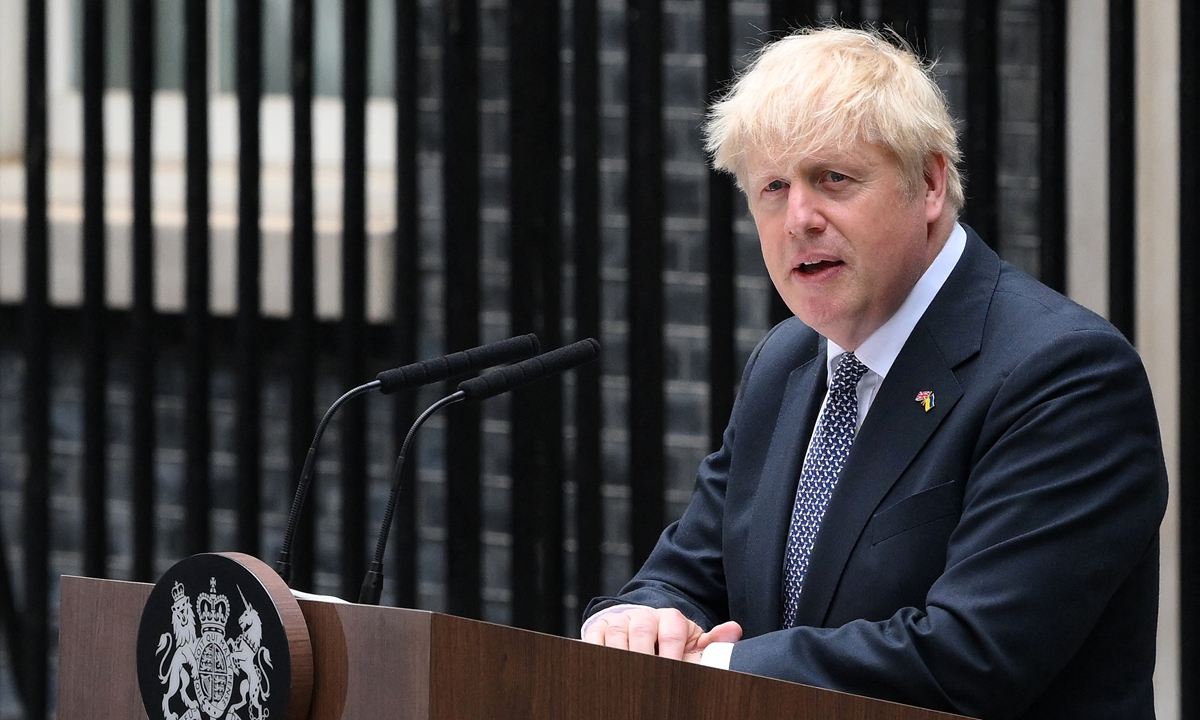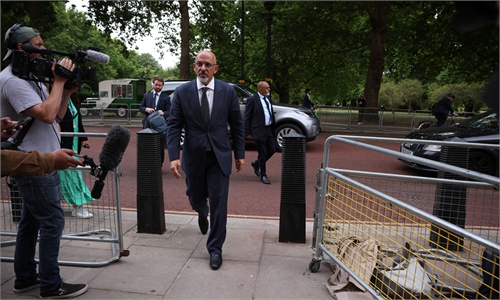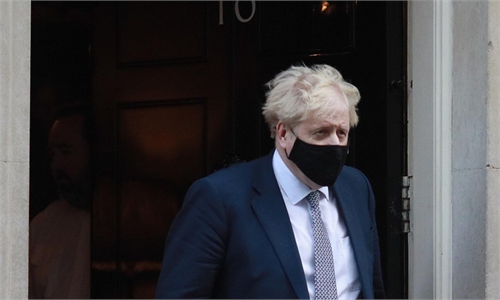
Britain's Prime Minister Boris Johnson makes a statement in front of 10 Downing Street in central London on Thursday.Photo:AFP
Boris Johnson on Thursday stepped down as leader of the Conservative Party after dozens of staff members quit their posts, making way for a new prime minister. This means Johnson becomes another British politician who cannot complete the tenure as prime minister after Theresa May. UK's frequent changes of political leaders since Brexit in 2016 are an inevitable result of a combined effect of British domestic politics and global political development. This mirrors the social governance crisis and structural contradictions in economic development prevailing in Western countries and the US.
Johnson's resignation is something that will happen sooner or later. Compared with May, Johnson lacks a real sense of mission and responsibility for British politics, and he does not have the political literacy to turn the tide in a crisis. During Johnson's administration, opportunism has completely replaced the seriousness of political life, and to a large extent dwarfed Britain's international image. His "Partygate" scandal has heavily undermined the public image of the government.
However, an overemphasis on Johnson's personal factors is far from sufficient to explain the primary reason why he has been abandoned by the Conservative Party. The UK's current political turmoil did not start with Johnson, and will not end with him. In fact, since Brexit, the British government has essentially lost its overall sense of direction in constructing the future. Chaos and disorder are the main features of British political life. Since Brexit, the livelihood issues of British society have not only not been alleviated, but also become more prominent because of the involvement of the novel coronavirus. However, the Conservative government has not come up with policies to fundamentally address social and livelihood issues. The inanition and formalization of political life has become a fundamental chronic disease of British society.
Johnson is essentially the epitome and embodiment of contemporary British political life. The British Conservative Party's more evident populist image fully indicates that the British society today is incapable of producing politicians who can truly take responsibility and make a difference. The banality of British political life at a critical moment in national development is by no means an accident.
Similar to the internal social governance, Britain's foreign policy is also in a period of difficult choices. In 2016, "Global Britain" was first mentioned by Johnson and May. Objectively speaking, "Global Britain" diplomatic strategy is indeed a forward-looking diplomatic plan based on the laws of development, and it also fully embodies the strategic literacy and level of Britain as a senior participant in international affairs. However, over the past years, UK's diplomatic practice has fundamentally turned its back on the diplomatic framework of its own "Global Strategy."
The essential feature of the current British diplomacy is that it has returned to the basic orientation of its traditional special relationship with the US in the post-Cold War period. Britain is actively serving as the pawn of US' global hegemonic foreign policy, and playing the role of strategist in the alliance of the US and the West, in a bid to ramp up its discourse power in international foreign affairs and chips in dealing with diplomatic relations with non-Western countries. Take China-US relations as an example. Since Johnson took office, UK's foreign policy toward China has still been stuck in the barriers of Cold War mentality and colonial cultural ideology. Some powerful politicians in the Conservative Party have spared no effort to ideologicalize China-UK relations, but they have never been able to break away from the theory of Western civilization's superiority and the Western value-centered theory, which has triggered essential damage to Britain's diplomatic interests in China. It should be noted that such deep-rooted political forces that go against the trend of the world are not a minority in British politics. Therefore, the development of Britain's foreign policy will not fundamentally change because of Johnson's resignation. British diplomacy needs a true "ideological emancipation." Has the British political circle braced it?
Although in terms of economy, the UK has been a power that cannot be underestimated, its advantages are on decline. Days ago, UK Foreign Secretary Liz Truss even said the UK wants to seize the assets of Russians in the UK in order to give them to Ukraine. Such a strategy is a fundamental trampling on the Britain's notion on business. Today, the UK's image and reputation seem to be at its lowest since the British Empire. The sun has set early on the country which was once portrayed as "the empire on which the sun never sets."
The author is a scholar at Shanghai International Studies University. opinion@globaltimes.com.cn


